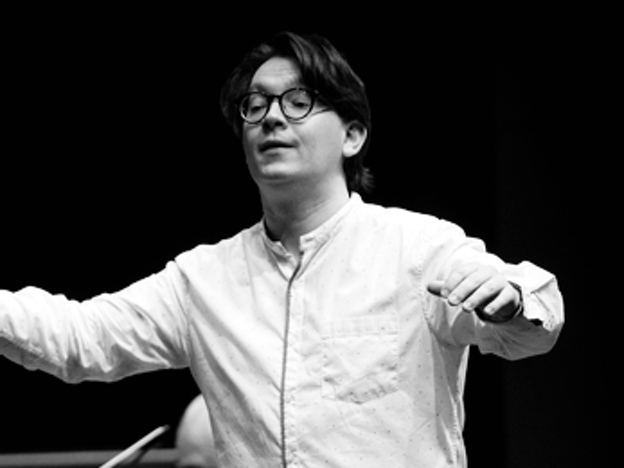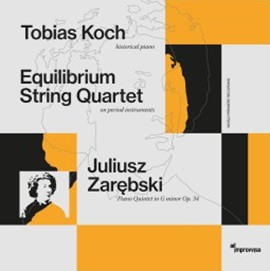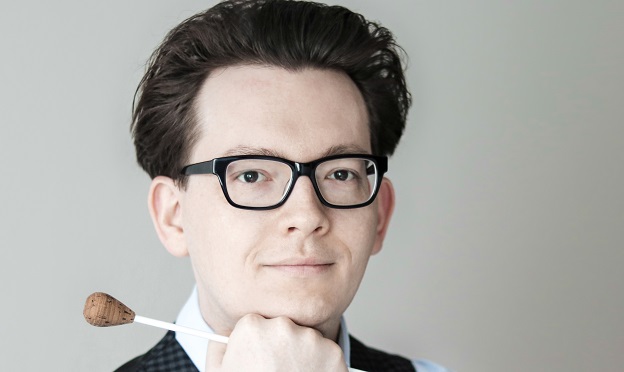Mateusz, as a German-Polish conductor you have roots in two important musical countries. Where do you belong to, musically?
The question of my musical identity is a very complex one. I was born and raised in Germany. As a conductor, my years as Marek Janowski’s assistant naturally had a profound influence on me through “his” repertoire – that is, Schumann, Brahms, Bruckner, Wagner, and Strauss. But perhaps that is also precisely why I am extremely happy that some time ago I was able to study Polish music very intensively as part of my PhD at the Krzysztof Penderecki Academy of Music in Cracow.
Even though the topic of my dissertation was Rachmaninov’s Second Symphony, during the doctoral viva, a kind of general musicology test taken before the defense, I had to answer questions from the examination committee on five topics over a period of two hours. The focus was on the composers Lutosławski, Penderecki, and Górecki. This allowed me to explore the diversity of this brilliant music in depth. And, I am also grateful to my parents for always ensuring that I came into contact with Polish music as a child. The first pieces I played on the piano were almost all by Polish composers, such as Marian Rybicki and Grażyna Bacewicz. Later, I learned some Preludes by Szymanowski, as well as Paderewski’s famous Minuet. I’ll leave Chopin out of this, as he is omnipresent in the life of a pianist anyway. All in all, however, I see myself as a musical cosmopolitan whose home is the music I currently conduct.
Which are the strongest impressions form your studies?
Despite my small hands, I had great ambitions as a pianist at the age of 19, which is why it seemed obvious to me to leave Dresden and go to Hanover to study. There I was accepted into Arie Vardi’s class. At that time, in 2006, the Hanover University of Music was the global epicenter of piano training. The triumvirate of professors also included Vladimir Krainev and Karl-Heinz Kämmerling, who have sadly since passed away. I studied together with many of today’s worldfamous pianists, such as Igor Levit, Beatrice Rana, Francesco Piemontesi, Yeoleum Son, Joseph Moog, and Alexej Gorlatch. You had to fight for your position. For me, this led in a very natural way to conducting. At some point, I could no longer bear to spend hours alone in a room with the “black-and-white keyboard monster”, as I still call it today. I had to get out, talk to people, share my enthusiasm, take responsibility. In other words, all the things and qualities that a conductor should definitely have and does on a daily basis. To this day, I am grateful to Arie Vardi for having the right instinct not to hold back my development as a conductor, but rather to encourage it.

Mateusz Moleda
What does Marek Janowski’s mentorship mean to you?
There is no musical personality who has influenced me more profoundly than he has. My history with him began much earlier, so to speak. He conducted La Bohème at the Semperoper and my parents sang Mimì and Rodolfo, when my mother was pregnant with me, as we found out from a newspaper review. Many years later, in my mid-twenties, when I had already built up a basic repertoire as a conductor, my parents thought I might need a mentor. We went through the list of conductors they had sung under, and it was clear to them that I should contact Marek Janowski. I wrote him a letter. He was then chief conductor of the Berlin Radio Symphony Orchestra and immediately invited me to a rehearsal. For me, this was one of the most overwhelming experiences as a musician. The way he worked on Bruckner’s Ninth Symphony and Messiaen’s L’Ascension moved and fascinated me deeply. I absorbed his austere, highly focused, and ultra-efficient approach to rehearsals and, admittedly, tried to copy it. Not only that, but also his conducting style. That may have been a bit too much of a good thing, but it worked out well in the end. The late Christoph von Dohnányi always advised young conductors to first try to copy the style of someone they really admire and learn how they work. To quote him further, at some point, one overcomes this phase. It’s like painting. Most of the great masters – personalities such as Goya – started out by copying other paintings and eventually developed their own style. Kurt Sanderling also describes this process in exactly the same way in his autobiography. Today, more than a decade later, that’s exactly what has happened to me. I am simply myself, though I carry a lot of Janowski within me. We are still in contact today and recently met before my debut at the Semperoper with the Staatskapelle Dresden. He asked me straight away about the repertoire and gave me some valuable advices for Mendelssohn’s Scottish Symphony. I couldn’t have wished for a better mentor.
In October 2023, you won 1st Prize and the Orchestra’s Special Prize at the prestigious Sergei Kussewitzky International Conducting Competition. Describe your experience from this competition.
To start, I have never been a supporter of music competitions. Bartók was absolutely right when he said that they are for horses, not musicians. Without the coronavirus pandemic, I would never have been interested in conducting competitions, but the lethargy of the times and the lack of performance opportunities made me change my mind. I chose the Kussewitzky Competition because, after the video selection, only eight candidates are invited, and they have a full 45 minutes to work with the orchestra in the first round on site. This differs significantly from other competitions where sometimes more than hundred candidates arrive to rehearse the first few bars of a Beethoven overture for ten minutes or, worse, simply conduct through it. Even in the subsequent rounds, the time with the orchestra is often limited to 30 minutes. In the final of the Kussewitzki Competition, the rehearsal time was once again very generous: the three of us finalists had 90 minutes to prepare a symphony that had been drawn blindly from a ballot box. I remember that I had chosen Schubert’s Third Symphony. What really helped me during rehearsal was what I had learned from Janowski, namely to concentrate on the most important things when time is short. So I finished after exactly 89 minutes and 45 seconds and still had 15 seconds left to thank the orchestra for their cooperation and wish us all a wonderful concert that evening. Because that’s where the rehearsed three different symphonies were then performed by the three of us. The Special Prize of the Orchestra, which I received in addition to the 1st Prize, means a lot to me because it was awarded to me after a secret vote by all the orchestra musicians, independently of the jury’s vote.
It looks like you have a broad interest in music, from Early Music to contemporary. Don’t you think a conductor should specialize in a certain field?
As long as you are young as a conductor – judging by Herbert Blomstedt’s age, I would say that this is still the case in your early 50s – you should absorb all kinds of music and engage with it as thoroughly as possible. Busoni once said: “Bach is the beginning of all music, Liszt the end. And both will enable you a good Beethoven.” I think there is a great deal of truth and practicality in this statement. Applied to a conductor in the 21st century, this would mean engaging with the music of Orlando di Lasso and William Byrd as well as that of Unsuk Chin and Thomas Adès. No matter what your opinion of it is or what your personal sound preferences are. The danger with specialization is always that you can’t see the forest for the trees. I try to avoid that, even though I naturally have my favorite composers and works. And just because I studied harpsichord, fortepiano, and historical performance practice in Hanover as a second major alongside piano, I would never even think about leading a Baroque orchestra today. But I do draw on these experiences when conducting Shostakovich, for example.
What’s the best thing about conducting?
The emotions. Despite all the technical tasks involved, such as coordinating the individual instruments and instrument groups as part of creating vertical precision, maintaining constant vigilance over the horizontal balance of the sound, and paying attention to the metaphysical processes in exchange with the musicians, conducting is a highly emotional act. Conducting is both thrilling and joyful, and for me it is a privilege to be able to experience and share these feelings again and again.
What goals and milestones do you want to achieve in the future? What are you working towards?
I could now list a few works that I would like to conduct. Or say that I would like to work with one orchestra or another. Depending on the perspective, the stars are either high up or low down, so that they will either become attainable for me at some point or perhaps remain forever out of reach. However, I don’t think that’s what your question is about. My credo is actually quite simple: the journey is the destination. Of course, it would be nice to commit to working with an orchestra for a longer period of time at some point and thus leave a lasting mark. But for that to happen, more than one factor has to be right. And my experience in this regard has taught me that you can’t rush things. What will be, will be. What won’t be, won’t be, or perhaps it’s just not meant to be. You can’t force happiness. But you can make a commitment to yourself to do everything you can to conscientiously nurture the talents you have been given. And to do so day after day until you reach the age of Herbert Blomstedt and beyond.























